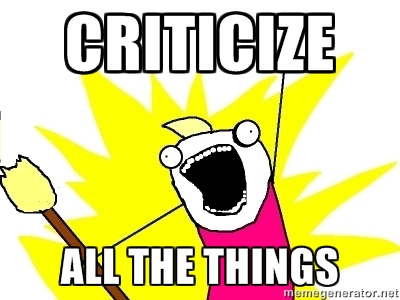
Our best college students are very good at being critical. In fact being smart, for many, means being critical. Having strong critical skills shows that you will not be easily fooled. It is a sign of sophistication …
The combination of resistance to influence and deflection of responsibility by confessing to one’s advantages is a sure sign of one’s ability to negotiate the politics of learning on campus. But this ability will not take you very far beyond the university. Taking things apart, or taking people down, can provide the satisfactions of cynicism. But this is thin gruel.
The skill at unmasking error, or simple intellectual one-upmanship, is not totally without value, but we should be wary of creating a class of self-satisfied debunkers … In overdeveloping the capacity to show how texts, institutions or people fail to accomplish what they set out to do, we may be depriving students of the chance to learn as much as possible from what they study.
From an excellent post on the New York Times‘ The Stone blog by Michael S. Roth, president of Wesleyan University, titled “Young Minds in Critical Condition.” After almost 15 years teaching in North American universities, I can only agree.
It unfortunately goes well beyond the university, however. One need only read the comments sections of most news websites, Yelp reviews, or Reddit threads to realize that increasingly, people’s default position is to want to question everything.
Now, don’t get me wrong. Questioning the why and the how of things is a useful skill, especially if one is able to change one’s mind on the basis of that questioning. Sadly, most of those daily so-called displays of critical thinking are nothing more than people being contrarian for the sake of being contrarian.
It is as though people are so afraid of being labeled “not smart” that they feel compelled to find the flaws in all the statements they are presented with. But part of being smart is knowing how to pick your battles and learning when not to unnecessarily antagonize others.